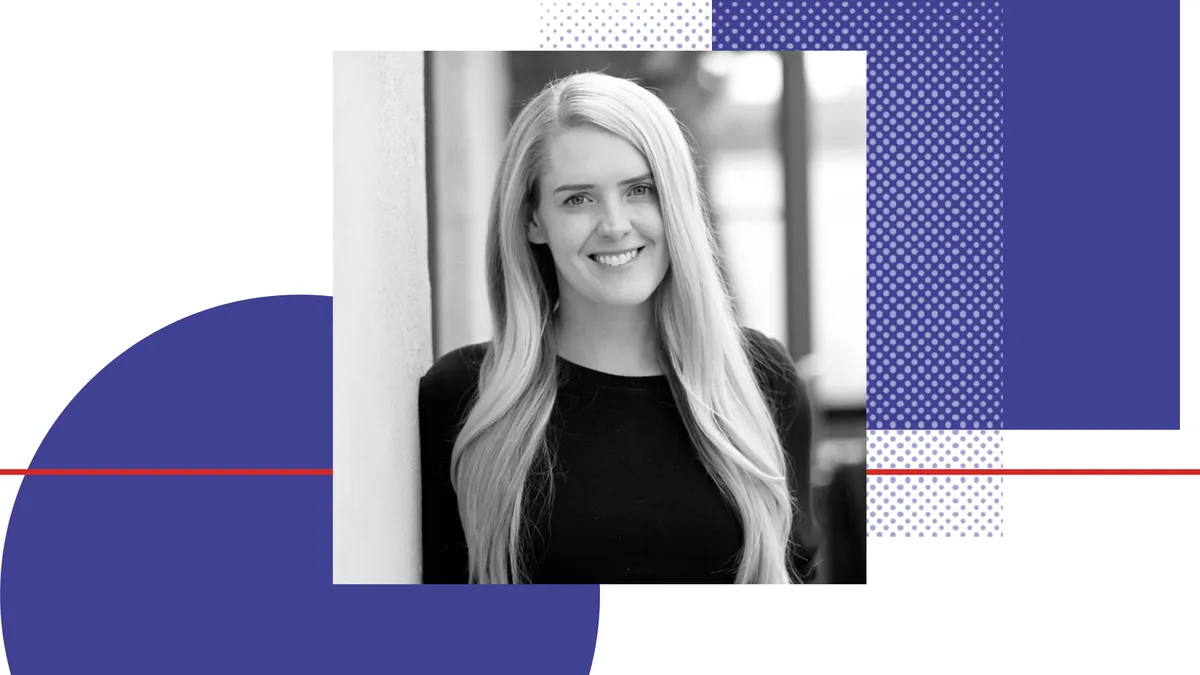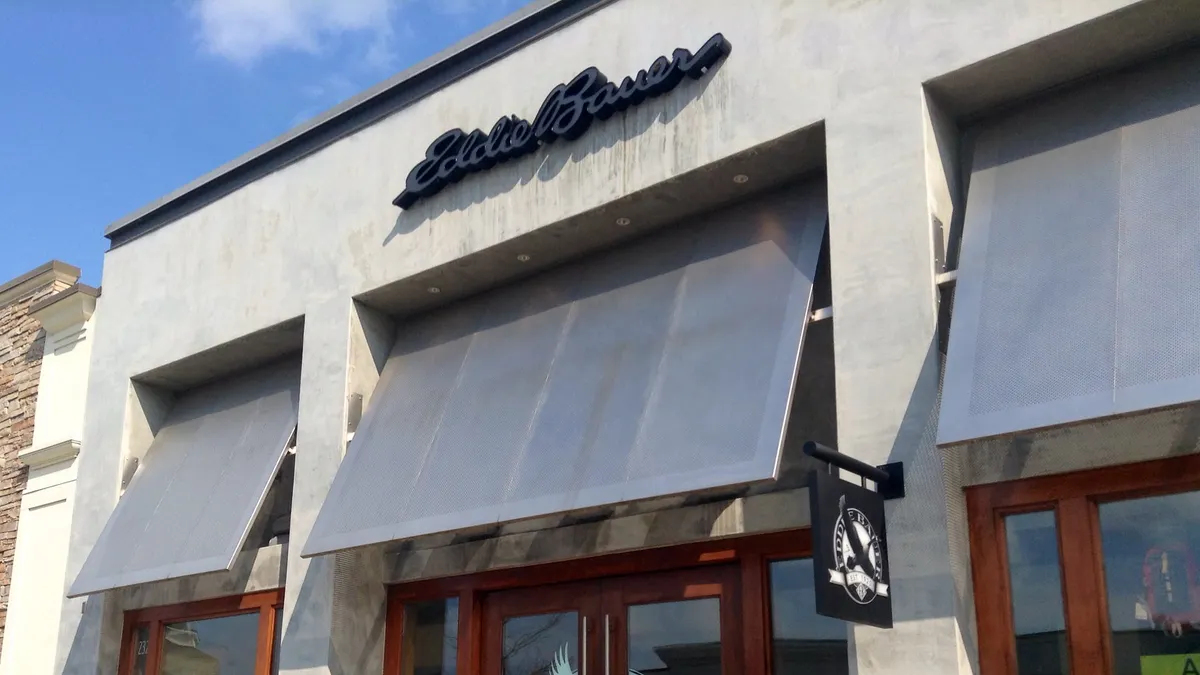2020 wasn't the smoothest of times to join a new company. When Catherine Pike moved over to athletics apparel DTC brand Vuori in January of last year as its senior director of retail, she had her own plan for how the year would go. The pandemic changed that.
"What I envisioned my first year being was getting in there, starting to sign some great leases, working on the expansion plan and then working on that three-year strategy," Pike said. "So the first two months were incredible — I got to know the brand — and then, obviously, March hit and we went into full shutdown just like everyone else did."
Vuori was fortunate, like many other DTC brands, to be small enough that shutting down store operations wasn't catastrophic. Now, the company is focused once again on opening stores, and is building out the team to do so. Pike told Retail Dive in May that Vuori was on the verge of opening a store in Boulder, Colorado, it's first outside of California, and on Friday, the DTC brand opened its eighth location in San Jose, California.
While the pandemic put some of Vuori's brick-and-mortar plans on pause, the company didn't ignore the channel. Instead, Vuori spent the time building out a training program for an "omni-associate role" to facilitate what it saw as the new normal once stores reopened.
"We cross trained our retail associates with customer service so that when we did return to what first ended up being curbside, and then ended up being our modified opening, we could really meet the customer where they were at and acknowledge that some of our store customers have become now online customers," Pike said. "So when they did return to the store, or even if they didn't, our associates were going to be really well-rounded in being able to help them in whatever channel they wanted to shop in."
That experiment has become permanent, and now all Vuori stores have at least two omni associates working, an acknowledgment that digital and physical retail are even more intertwined than pre-pandemic. They spend, on average, three days working in stores and two days on customer service running Vuori's live chat.
It's a shift that's emblematic of Vuori's larger strategy during the pandemic: to use an unusual time in retail to make investments for the post-pandemic future.
Ground work
One of the main tenets of Vuori's strategy was to keep its brand relationships strong.
For many DTCs, online sales took off during the pandemic. Even now, according to direct mail marketing company Belardi Wong, which specializes in working with DTC brands, 86% of its clients in April reported year-over-year sales increases, with 68% posting growth over 2019. Around 80% of its clients have been reporting year-over-year growth throughout the pandemic, the company said in an email to Retail Dive. That growth slowed in May, with 67% growing year over year.
Thanks to Vuori's comfort clothing and athletics positioning, it was one of the digital-native brands to benefit from spiking online sales. In an attempt to build on the digital success, Pike and her team turned their attention to making the Vuori experience more fun — and convenient — for the brand's loyal customers. It was a bid to keep customer relationships positive without the aid of the normal in-store shopping experience.
Like almost everyone else in retail, Vuori scraped together a curbside pickup offering, but it also tried to put some more personal touches into online shopping where possible. For Mother's Day and Father's Day 2020, Vuori ran a promotion where the brand would deliver packages straight to people's houses for a limited number of customers. For those that signed up, Vuori employees FaceTimed them from the store, then sent out their package with a delivery truck the brand usually used for product deliveries in Southern California.
"We literally shopped with people virtually through the store, they picked out their gifts and then we made sure that we had the right people driving," Pike said. Customers are still talking about the promotion, according to Pike. "Customers will come in today and say, 'That was so cool. That really helped me out. I didn't know how I was even going to get shopping done.'"
The idea throughout the pandemic was to strengthen relationships with its loyal customer base and make them "our secret sauce" once stores reopened, Pike said. The same could be said for keeping up contact with the fitness instructors it works with.
Pre-pandemic, retail associates were going to instructor's classes, getting to know trainers and setting up relationships with the brand. With the pandemic, of course, classes temporarily stopped, but Vuori wanted to make sure it still had strong relationships with influencers and brand partners once activities started back up again.
"We had daily fitness classes," Pike said. "We paid for their online classes and we kept up those relationships so that during a time when they also were in a land of uncertainty and struggling a bit, they knew we were still there and we were on their team."
In addition to relationship building, Vuori also spent some time working on its back-end operations.
Physical expansion, as expected, was temporarily put on pause in 2020. The company opened one store, in Malibu, California, and relocated another in Manhattan Beach, California, but most other plans were pushed out. Instead, Vuori took a similar approach to training its omni associates and spent some extra time to improve its current locations.
"We worked on store operational efficiency," Pike said. "When stores triple overnight in sales volume, you also have to figure out how to operationally keep up with that. So: new fixtures, remodeling, doing some things just to make sure that we're maximizing this growth that we've had."
In terms of getting customers back into stores once they reopened, Vuori's relationship building strategy seems to have worked. Even when Vuori's locations first reopened in the May and June timeframe, traffic was "well beyond what we could have ever imagined," according to Pike.
With such positive results upon reopening, Vuori took a strategy some of its fellow pandemic winners have also adopted: eyeing out advantageous leases in a favorable real estate market. Expansion talk started back up again in the back half of the year and now Vuori has plans for an additional five stores opening in the summer and fall: Abbot Kinney, La Jolla, Fashion Island and Palo Alto, all in California, and Cherry Creek in Colorado.
"There's definitely clear data that we have and we will use, and then the other portion of it is just really getting to know a community and saying, 'How do we think we fit in here?'"

Catherine Pike
Senior Director of Retail, Vuori
In exploring where to open next, Pike is not only looking at the geographic density of consumers shopping online with the brand, but also the opportunity to build up relationships in the community, whether it be with influencers, studios or gyms.
"There's definitely clear data that we have and we will use, and then the other portion of it is just really getting to know a community and saying, 'How do we think we fit in here?'" Pike said. "And the good news is there's just so many health- and lifestyle-oriented, active people and so many great communities throughout the U.S. It's going to be a really fun run for the next five years."
Comfort clothing post-pandemic
Vuori never doubted that physical retail would come back, but the company did question how deeply consumer behavior would impact shopping trends. Pike recalls the executive team wondering if they would have to open stores with larger footprints to account for more distance between people, or if fitting rooms would become obsolete because shoppers wouldn't want to use them anymore.
Those early fears never came to pass, and now perhaps the company's biggest concerns — and opportunities — lie in consumer fashion trends. Vuori became well known for its comfort clothing, including joggers and other loungewear, which quickly became everyday needs during a pandemic that kept many consumers at home for most of the day. In October, NPD even projected that sales of comfort clothing would make up 31% of total U.S. apparel spend during the holidays.
"We've always known that potential was there, but it was a matter of a tipping point of getting people to see it," Pike said of the brand's growth. The company also benefited from not cutting back on marketing spend at all, banking instead on the demand it was seeing to continue.
With vaccinations more widespread in the U.S., though, the popularity of athleisure and other comfortable clothing choices is in question, as some analysts project a return to the more fashionable apparel offerings so wholeheartedly rejected for the past year and a half. A return to fashion doesn't necessarily mean a decline for athleisure, though. Morgan Stanley analysts in a client note in May noted continued strength in health, wellness and casualization trends, a win for the likes of Nike and Adidas.
In a June report on apparel trends, NPD noted that dresses, shapewear and some other more fashion-based items have seen increased sales, but one-third of consumers consider dressing up as more casual than it was before the pandemic.
"As more people go back to work, and as travel and other experiences ramp up, dressing up will come back," Kristen Classi-Zummo, apparel analyst for NPD, said in a statement. "However, we had gotten so used to being comfortable, the pendulum won't swing back 100 percent in the other direction."
Pike acknowledged that, while customers are still coming in for joggers, the spend has shifted somewhat, a trend that might work in its favor since customers are discovering new categories at Vuori. The company's core performance offering is getting more attention, an area that has "tremendous growth" opportunity, and travel and commute are also picking up as people get back into old routines.
"Almost every conversation we had in early March in our stores was, 'I'm here, I'm so excited to finally go on this trip. I want to wear all Vuori, let's get me outfitted,'" Pike said. "So that was really fun and that was definitely a big trend to see people getting excited about the possibility of getting on a plane and going somewhere different."























